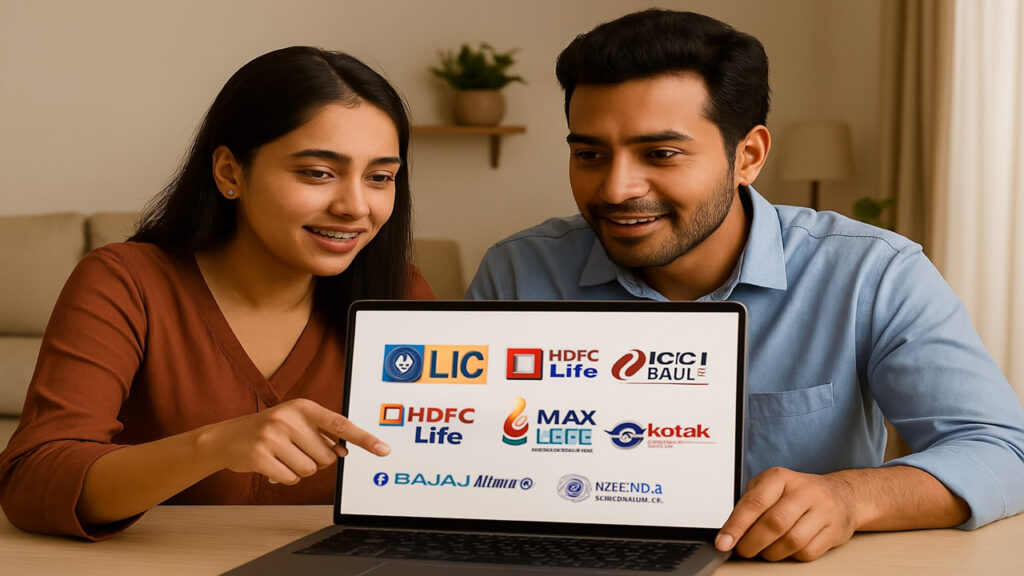What is the best term insurance plan in India for families? This question is one of the most common among those who are starting to think seriously about financial security. A term insurance plan is not just a product—it’s a financial shield that protects your loved ones if something unfortunate happens to the earning member of the family. For beginners, the Indian insurance market may seem confusing with so many options, but this guide will help simplify it. We’ll walk through what term insurance means, how to choose the right plan, and what are the best options available today for Indian families.
Understanding Term Insurance in Simple Terms
Term insurance is the most basic form of life insurance. It offers financial protection to your family by providing a fixed sum (called the “sum assured”) to your nominee if the policyholder dies during the policy term. Unlike endowment or money-back policies, term plans do not offer any maturity benefit if you survive the term. This is why the premiums are much lower compared to other life insurance products.
For a family, term insurance is critical. If the primary breadwinner is no longer around, the payout from the policy can help cover living expenses, education costs, debt repayment, and other essentials.

Why Families Should Prioritize Term Insurance
In India, many families rely on a single income earner. If that person passes away unexpectedly, the financial shock can be devastating. A good term insurance policy ensures that even in such difficult times, the family has a financial cushion to fall back on. It helps maintain the standard of living, keeps children’s education on track, and gives peace of mind to everyone involved.
Term plans are also tax-efficient. Under Section 80C of the Income Tax Act, premiums paid for term insurance are eligible for deductions up to ₹1.5 lakh annually. Moreover, the death benefit is tax-free under Section 10(10D).

Key Features to Look for in a Term Insurance Plan
Before we get into which plans are the best, it’s essential to understand what features make a term insurance plan good for a family.
- High Sum Assured at Low Premium: You want a policy that offers enough coverage to support your family, ideally 10 to 15 times your annual income.
- Long-Term Coverage: Choose a policy that provides protection up to the age of 65 or even 75, covering your most productive years.
- Claim Settlement Ratio (CSR): This is the percentage of claims a company settles. A higher CSR (above 95%) indicates a trustworthy insurer. You can check CSR data on the IRDAI website.
- Add-on Riders: Riders like accidental death benefit, critical illness, and waiver of premium enhance the policy’s coverage.
- Flexibility in Payout: Some plans allow a lump sum or monthly income for the family. Choose what best suits your family’s needs.

What is the Best Term Insurance Plan in India for Families in 2025?
Let’s now look at the top-rated term insurance plans that are ideal for families. These have been selected based on premium affordability, claim settlement ratio, features, and customer reviews.
1. HDFC Life Click 2 Protect Super
HDFC Life has consistently been one of India’s most trusted insurers. The Click 2 Protect Super plan offers multiple coverage options including Life, Life Plus, and Life Goal. It also allows for increasing cover over time, which is helpful as responsibilities grow. You can check the plan here.
2. LIC Tech Term Plan
LIC is India’s oldest and most respected insurer. The LIC Tech Term Plan is a pure online term plan that offers high sum assured at reasonable premiums. It comes with optional riders and flexible payout modes. Although slightly more expensive than private companies, it has unmatched trust. Visit LIC’s official site to know more.
3. Max Life Smart Secure Plus Plan
Max Life offers competitive premiums with a CSR above 99%. This plan includes terminal illness benefits, premium return options, and even an increasing life cover feature. Families also benefit from flexible monthly income options. You can find more details on their website.
4. Tata AIA Sampoorna Raksha Supreme
This plan provides wide-ranging coverage with options for whole life (up to age 100), and riders such as critical illness and hospital care. With a high CSR and flexible premium payment terms, it’s ideal for young families. Explore more here.
5. ICICI Pru iProtect Smart
This plan from ICICI Prudential is packed with features including 34 critical illness covers, accidental death cover, and disability rider. It allows policyholders to choose between lump sum, income, or a mix payout for beneficiaries. The online process is easy and quick. More information is available here.

How Much Term Insurance Should a Family Have?
The ideal sum assured depends on your age, income, liabilities, and family structure. A general rule is to aim for 10 to 15 times your annual income. If you have loans or young children, consider even higher coverage. Always include future inflation while estimating your needs.
Use an online term insurance calculator to determine your ideal cover and premium.

How to Buy the Right Term Insurance Plan?
Buying term insurance is now easier than ever, thanks to digital platforms. Here’s how you can go about it:
- Compare different plans on trusted aggregators like Policybazaar or Coverfox.
- Read the fine print, especially for claim exclusions and rider details.
- Fill the application form truthfully and undergo the required medical tests.
- Always nominate a trustworthy family member.
Once the policy is issued, inform your nominee and share the policy documents with them.

Final Thoughts
So, what is the best term insurance plan in India for families? The answer depends on your family’s unique needs, but plans from LIC, HDFC Life, Max Life, ICICI Prudential, and Tata AIA are excellent starting points. For most families, affordability, simplicity, and trust are the key decision-making factors. Take your time to compare and choose wisely.
A term insurance plan is not an expense; it’s a necessity for anyone with dependents. The peace of mind that comes from knowing your family will be financially secure—even when you’re not around—is priceless.
FAQs
Q1. What is term insurance and why is it important for families?
A: Term insurance is a type of life insurance that provides a fixed lump sum to your family if the policyholder dies during the policy term. It’s essential for families as it acts as a financial safety net, helping cover debts, household expenses, education, and future planning.
Q2. What is the best term insurance plan in India for families?
A: Some of the top-rated term insurance plans in India for families are:
- HDFC Life Click 2 Protect Super
- ICICI Prudential iProtect Smart
- SBI Life eShield Next
- Tata AIA Maha Raksha Supreme
- PNB MetLife Mera Term Plan Plus
These plans offer high claim settlement ratios, flexible benefits, and essential riders.
Q3. How much sum assured should I choose?
A: Ideally, your sum assured should be 10 to 15 times your annual income. For a more tailored amount, use a Human Life Value (HLV) calculator, which considers income, liabilities, and future expenses.
Q4. What policy term is suitable for family protection?
A: Select a policy term that lasts until you retire or your financial dependents (spouse, children) become self-sufficient—commonly up to age 60 or 65.
Q5. Are riders necessary in term insurance plans?
A: Yes, riders enhance your plan’s coverage. The most useful ones include:
- Accidental Death Benefit Rider
- Waiver of Premium Rider
Avoid overloading your policy with riders—keep them focused and relevant.
Q6. Should I choose a Return of Premium (ROP) plan?
A: ROP plans refund your premiums if you outlive the policy. However, they are costlier. Many financial experts recommend pure term plans and suggest investing the cost difference separately for better returns.
Q7. What is a good Claim Settlement Ratio (CSR) to look for?
A: A CSR of 98% or above is considered excellent. It shows that the insurer is reliable and has a strong history of settling claims promptly.
Q8. Can I increase the coverage amount later?
A: Yes, several plans offer life-stage or increasing cover options, allowing you to enhance the sum assured during major life events like marriage, childbirth, or salary hikes.
Q9. Is it safe to buy term insurance online?
A: Absolutely. Buying online is secure and often cheaper, as it removes agent commissions. Always purchase from official company websites or trusted aggregators.
Q10. What if I miss paying premiums?
A: If you miss a premium, the policy may lapse. Most insurers offer a grace period (15–30 days) to pay the premium. If the policy lapses, you may have to go through a revival process which might include medical checks.

